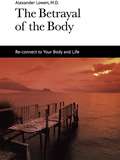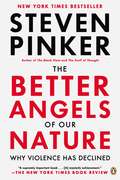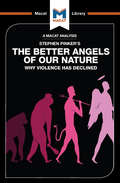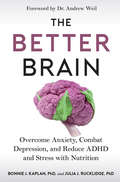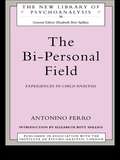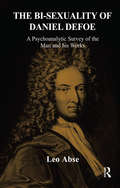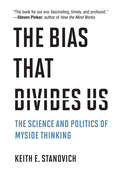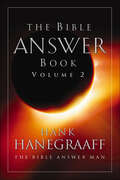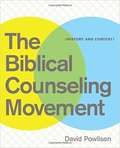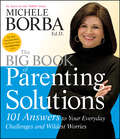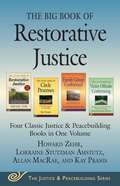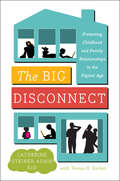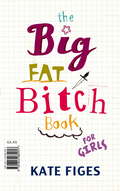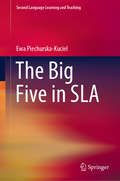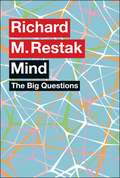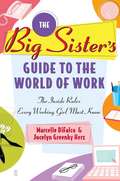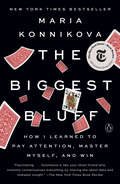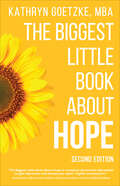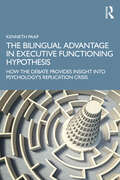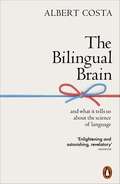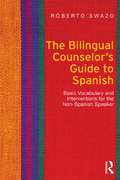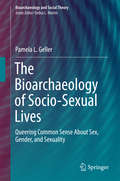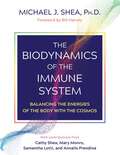- Table View
- List View
The Betrayal of the Body
by Alexander LowenThe Betrayal of the Body is Alexander Lowen's pioneering study of the mind-body split.Lowen describes the way people deny the reality, needs, and feelings of their bodies. This denial leads to the development of the division between mind and body, creating an over-charged ego obsessed with thinking at the expense of feeling and being. This book illustrates the energetic factors behind the split, the factors that produce it, and the proven therapeutic techniques that are available to treat it. Lowen further explores the mind-body duality in the individual and its parallel duality and dysfunction in society between culture and nature, and between thinking and feeling.
The Better Angels of Our Nature: Why Violence Has Declined (Playaway Adult Nonfiction Ser.)
by Steven PinkerFaced with the ceaseless stream of news about war, crime, and terrorism, one could easily think we live in the most violent age ever seen. Yet as New York Times bestselling author Steven Pinker shows in this startling and engaging new work, just the opposite is true: violence has been diminishing for millennia and we may be living in the most peaceful time in our species's existence. For most of history, war, slavery, infanticide, child abuse, assassinations, pogroms, gruesome punishments, deadly quarrels, and genocide were ordinary features of life. But today, Pinker shows (with the help of more than a hundred graphs and maps) all these forms of violence have dwindled and are widely condemned. How has this happened?<P><P> This groundbreaking book continues Pinker's exploration of the essence of human nature, mixing psychology and history to provide a remarkable picture of an increasingly nonviolent world. The key, he explains, is to understand our intrinsic motives- the inner demons that incline us toward violence and the better angels that steer us away-and how changing circumstances have allowed our better angels to prevail. Exploding fatalist myths about humankind's inherent violence and the curse of modernity, this ambitious and provocative book is sure to be hotly debated in living rooms and the Pentagon alike, and will challenge and change the way we think about our society.<P> Chosen for Mark Zuckerberg's "A Year of Books" <P><b>A New York Times Bestseller</b>
The Better Angels of Our Nature: Why Violence has Declined
by Joulia SmortchkovaReasoning is the critical thinking skill concerned with the production of arguments: making them coherent, consistent, and well-supported; and responding to opposing positions where necessary. The Better Angels of Our Nature offers a step-by-step class in precisely these skills. Author Steven Pinker's central thesis is simple: mankind has become increasingly less violent over the centuries, and will continue to do so. Pinker is aware, though, that many people instinctively believe the opposite, and Better Angels is devoted to marshalling data to support and illustrate this central argument, as well as a series of secondary arguments about how and why humanity has become less violent. Pinker's interpretative skills – understanding the meaning of the complex evidence from history – are also on display throughout, as he tackles the ambiguities of his data, the problems it presents, and the viable inferences one can draw from it.
The Better Brain: Overcome Anxiety, Combat Depression, and Reduce ADHD and Stress with Nutrition
by Bonnie J. Kaplan Julia J. RucklidgeA paradigm-shifting approach to treating mental disorders like anxiety, depression, and ADHD with food and nutrients, based on the original, groundbreaking research of two leading scientists. We are in the midst of a mental health crisis. An estimated one in five American adults suffer from some form of mental illness. Despite the billions of dollars spent in pharmaceutical research and the rising popularity of antidepressant drugs, we are more depressed and anxious than ever before. What if we&’re looking for solutions in the wrong places? What if instead of treating mental illness with prescriptions and medication, we changed what we eat and how we feed our brains? Leading scientists Bonnie Kaplan, PhD and Julia Rucklidge, PhD have dedicated their lives to studying the role of nutrition in mental health. Together, they have published over 300 peer-reviewed scientific papers, many of which reveal the healing power of nutrients in the form of vitamins and minerals, and the surprising role they play in brain health. In this paradigm-shifting book, Kaplan and Rucklidge share their groundbreaking research, explaining how to feed your brain to stabilize your mood, stave off depression, and make yourself more resilient to daily stress. The Better Brain uncovers the hidden causes of the rising rates of depression and anxiety, from the decrease of nutrients in our soil to our over-reliance on processed food, and provides a comprehensive program for better brain health, featuring The ideal diet for your brain: a Mediterranean-style diet rich in fresh fruits, vegetables, nuts, and seeds.More than 30 delicious, mood-boosting recipes.Crucial advice on when to supplement and how.The Better Brain is your complete guide to a happier, healthier brain.
The Bi-Personal Field: Experiences in Child Analysis (The New Library of Psychoanalysis #Vol. 38)
by Antonino FerroIn The Bi-Personal Field Antonino Ferro sets out his new conceptual system for analysis, considering not only the inner world of the patient but the continued interaction of that world with the inner world of the analyst. The book takes a fresh look at the main aspects of theory and technique in psychoanalysis in the light of Kleinian developments. It reflects the drastic changes due to the thinking of Bion. Illustrated with numerous detailed clinical examples, the author claims that the basic focus of the analytic relationship is the conscious and unconscious interpersonal/ intersubjective processes going on between the analyst and patient.
The Bi-sexuality of Daniel Defoe: A Psychoanalytic Survey of the Man and His Works
by Leo AbseThis book presents an intriguing and novel Freudian overview of all Daniel Defoe's major works by confronting various psychoanalytic hypotheses regarding Defoe. It is an original, well-documented, and compelling cross-disciplinary approach to identity issues and creative genius of Defoe.
The Bias That Divides Us: The Science and Politics of Myside Thinking
by Keith E. StanovichWhy we don't live in a post-truth society but rather a myside society: what science tells us about the bias that poisons our politics.In The Bias That Divides Us, psychologist Keith Stanovich argues provocatively that we don't live in a post-truth society, as has been claimed, but rather a myside society. Our problem is not that we are unable to value and respect truth and facts, but that we are unable to agree on commonly accepted truth and facts. We believe that our side knows the truth. Post-truth? That describes the other side. The inevitable result is political polarization. Stanovich shows what science can tell us about myside bias: how common it is, how to avoid it, and what purposes it serves. Stanovich explains that although myside bias is ubiquitous, it is an outlier among cognitive biases. It is unpredictable. Intelligence does not inoculate against it, and myside bias in one domain is not a good indicator of bias shown in any other domain. Stanovich argues that because of its outlier status, myside bias creates a true blind spot among the cognitive elite--those who are high in intelligence, executive functioning, or other valued psychological dispositions. They may consider themselves unbiased and purely rational in their thinking, but in fact they are just as biased as everyone else. Stanovich investigates how this bias blind spot contributes to our current ideologically polarized politics, connecting it to another recent trend: the decline of trust in university research as a disinterested arbiter.
The Bible Answer Book: Volume 2 (The Bible Answer Book)
by Hank HanegraaffThe Bible Answer Book Volume 1 covered 81 of the top questions that Hank Hangegraaff, the Bible Answer Man, has answered in his ministry. Now he's coming back in Volume II with more questions and answers. Selected from among the thousands of topics he's addressed over the years, topics include family, faith, fear, sin, salvation, and many more issues vital to better understanding God. Each question is approached in Hanegraaff's scholarly, concise, yet easy-to-understand style, and he even suggests additional sources for readers who want to explore the topics further.
The Biblical Counseling Movement: History And Context
by David Arthur PowlisonBeginning in the late 1960s, a biblical counseling movement sought to reclaim counseling for the church and provide a Christian alternative to mainstream psychiatry and psychotherapy. The Biblical Counseling Movement: History and Context is an informative and thought-provoking account of that movement. This historical account combines careful scholarship with a unique, eyewitness insight. This book is an invaluable resource for those who want to understand the biblical counseling movement. The core chapters were originally a Ph.D. dissertation in history of science and medicine (University of Pennsylvania). This new edition adds a lengthy appendix, containing articles by Dr. Powlison that give an analysis of developments within the biblical counseling movement and in its relationship to evangelical psychotherapists.
The Big Book of Parenting Solutions: 101 Answers to Your Everyday Challenges and Wildest Worries (Child Development #1)
by Michele BorbaThe Today show expert &“tackles 101 issues ranging from sibling rivalry, lying and peer pressure to cell-phone use and TV addiction . . . Indispensable&” (Publishers Weekly). A recommended read for moms by Working Mother magazine. In this down-to-earth guide, parenting expert Michele Borba offers advice for dealing with children&’s difficult behavior and hot button issues including biting, temper tantrums, cheating, bad friends, inappropriate clothing, sex, drugs, peer pressure, and much more. Written for parents of kids age 3-13, this book offers easy-to-implement advice for the most important challenges parents face with kids from toddlers to tweens. Includes immediate solutions to the most common childhood problems and challenges Written by Today&’s resident parenting expert Michele Borba Offers clear step-by-step guidance for solving difficult childhood behaviors and family conflicts Contains a wealth of advice that is easy-to-follow and gets quick results Author has written outstanding parenting books including Building Moral Intelligence, No More Misbehavin&’, Don&’t Give Me that Attitude, and more Each of the 101 issues includes clear questions, specific step-by-step solutions, and advice that is age appropriate. &“Moms and dads have come to rely on Dr. Borba for advice on issues large and small. The Big Book of Parenting Solutions is an indispensable, comprehensive, and authoritative guide to the wonderful and sometimes wacky world of parenthood. You&’ll find yourself dipping into it for answers again and again.&” —Dana Points, Editor-in-Chief, Parents Magazine &“The easy-to-use problem/solution format will have you battling your biggest parenting crises with confidence.&” —Working Mother
The Big Book of Restorative Justice: Four Classic Justice & Peacebuilding Books in One Volume (Justice and Peacebuilding)
by Howard Zehr Kay Pranis Allan Macrae Lorraine AmstutzFor the first time, the four most popular restorative justice books in the Justice & Peacebuilding series—The Little Book of Restorative Justice: Revised and Updated, The Little Book of Victim Offender Conferencing, The Little Book of Family Group Conferences, and The Little Book of Circle Processes—are available in one affordable volume. Restorative justice, with its emphasis on identifying the justice needs of everyone involved in a crime, is a worldwide movement of growing influence that is helping victims and communities heal while holding criminals accountable for their actions. This is not a soft-on-crime, feel-good philosophy, but rather a concrete effort to bring justice and healing to everyone involved in a crime. Circle processes draw from the Native American tradition of gathering in a circle to solve problems as a community. Peacemaking circles are used in neighborhoods, in schools, in the workplace, and in social services to support victims of all kinds, resolve behavior problems, and create positive climates. Each book is written by a scholar at the forefront of these movements, making this important reading for classrooms, community leaders, and anyone involved with conflict resolution.
The Big Disconnect
by Teresa H. Barker Edd Catherine Steiner-AdairHave iPads replaced conversation at the dinner table? What do infants observe when their parents are on their smartphones? Should you be your childs Facebook friend?As the focus of family has turned to the glow of the screen--children constantly texting their friends, parents working online around the clock--everyday life is undergoing a massive transformation. Easy availability to the Internet and social media has erased the boundaries that protect children from the unsavory aspects of adult life. Parents often feel they are losing a meaningful connection with their children. Children are feeling lonely and alienated. The digital world is here to stay, but what are families losing with technologys gain?As renowned clinical psychologist Catherine Steiner-Adair explains, families are in crisis around this issue, and even more so than they realize. Not only do chronic tech distractions have deep and lasting effects, but children desperately need parents to provide what tech cannot: close, significant interactions with the adults in their lives. Drawing on real-life stories from her clinical work with children and parents, and her consulting work with educators and experts across the country, Steiner-Adair offers insights and advice that can help parents achieve greater under-standing, authority, and confidence as they come up against the tech revolution unfolding in their living rooms. We all know that deep connection with the people we love means everything to us. Its time to look with fresh eyes and an open mind at the disconnection we are experiencing from our extreme device dependence. Its never too late to put down the iPad and come to the dinner table.
The Big Fat Bitch Book
by Kate FigesWhy do women excel at bitching? And are there ways to do it well?In this unique and entertaining book, Kate Figes explores girltalk, the way bitching erupts amongst teenage girls, the tenacity of female stereotypes as well as essential guidance on being the best kind of bitch - strong and self-assured rather than the bitch that needs to put other women down to feel stronger. Packed with witty anecdote, etiquette, interviews and contributions from strong bitches such as Kathy Lette, Wendy Holden and Virginia Ironside this is a must read for all women on the most delicious, yet dangerous of verbal art forms.
The Big Fat Bitch Book
by Kate FigesWhy do women excel at bitching? And are there ways to do it well?In this unique and entertaining book, Kate Figes explores girltalk, the way bitching erupts amongst teenage girls, the tenacity of female stereotypes as well as essential guidance on being the best kind of bitch - strong and self-assured rather than the bitch that needs to put other women down to feel stronger. Packed with witty anecdote, etiquette, interviews and contributions from strong bitches such as Kathy Lette, Wendy Holden and Virginia Ironside this is a must read for all women on the most delicious, yet dangerous of verbal art forms.
The Big Five in SLA (Second Language Learning and Teaching)
by Ewa Piechurska-KucielThis book also focuses on analyzing each trait from the point of view of its higher and lower order structure, as well as from the affective, cognitive, behavioral, social and academic perspectives, apart from outlining the field of personality psychology. Personality traits are important in daily interaction, and are a significant factor in achieving educational goals also for second and foreign language (L2) learners. Consequently, studying the role of personality in the field of second language acquisition (SLA) appears to be of primary importance, especially because there has been little research on this subject. Moreover, general results pertaining to the role of personality in L2 are inconclusive. This book’s primary objective is to present a concise and updated picture of personality on the basis of the Big Five model, which is accessible for non-psychologists. The middle part of the book focuses on discussing potential merits and drawbacks of each trait for the purpose of the process of SLA, both from the formal and informal, theoretical and empirical points of view. The next part includes a description of an empirical study, whose main aim is to sensitize the reader to direct and indirect influences that personality may exert on L2 learning. The book closes with a concluding chapter aiming at clarifying directions for further empirical study of personality as well as issues in research methodology.
The Big Questions: Mind
by Richard M. Restak'The Big Questions' series is designed to let renowned experts confront the 20 most fundamental and frequently asked questions of a major branch of science or philosophy. In 'The Big Questions: Mind' the explanations behind the 'mysteries' of our unique minds - including how they differ from our brains and how they create our awareness - are explored. Among the questions discussed are: How do brains come to exist? Is the mind more than the brain? What does it mean to be conscious? What is knowledge? Does the mind play tricks? What is the 'I' in our brain?
The Big Sister's Guide to the World of Work
by Jocelyn Greenky Herz Marcelle Langan DifalcoEVERY WORKING WOMAN NEEDS A BIG SISTER In just one eight-hour day, a working woman can get more twisted up than panty hose in the spin cycle. The Big Sister's Guide to the World of Work will straighten her out. This tell-it-like-it-is handbook gives every working woman the tools for facing the forces of evil and opportunity in corporate America, including how to: Sidestep the classic mistakes women make in a new job Avoid getting tangled up in office politics Banish the seven habits that make you look small Get your boss on your side (without kissing up) Once entry-level know-nothings who rose to the top of the corporate ranks, DiFalco and Herz have been the go-to big sisters for hundreds of women who were mystified and mortified at the office. Now you can arm yourself with the authors' straight-shooting advice. Uninhibited and fiercely wise -- like the very best big sisters -- they are the mentors every working woman needs.
The Biggest Bluff: How I Learned to Pay Attention, Master Myself, and Win
by Maria KonnikovaHow a New York Times bestselling author and New Yorker contributor parlayed a strong grasp of the science of human decision-making and a woeful ignorance of cards into a life-changing run as a professional poker player, under the wing of a legend of the gameIt's true that Maria Konnikova had never actually played poker before and didn't even know the rules when she approached Erik Seidel, Poker Hall of Fame inductee and winner of tens of millions of dollars in earnings, and convinced him to be her mentor. But she knew her man: a famously thoughtful and broad-minded player, he was intrigued by her pitch that she wasn't interested in making money so much as learning about life. She had faced a stretch of personal bad luck, and her reflections on the role of chance had led her to a giant of game theory, who pointed her to poker as the ultimate master class in learning to distinguish between what can be controlled and what can't. And she certainly brought something to the table, including a Ph.D. in psychology and an acclaimed and growing body of work on human behavior and how to hack it. So Seidel was in, and soon she was down the rabbit hole with him, into the wild, fiercely competitive, overwhelmingly masculine world of high-stakes Texas Hold'em, their initial end point the following year's World Series of Poker.But then something extraordinary happened. Under Seidel's guidance, Konnikova did have many epiphanies about life that derived from her new pursuit, including how to better read, not just her opponents but far more importantly herself; how to identify what tilted her into an emotional state that got in the way of good decisions; and how to get to a place where she could accept luck for what it was, and what it wasn't. But she also began to win. And win. In a little over a year, she began making earnest money from tournaments, ultimately totaling hundreds of thousands of dollars. She won a major title, got a sponsor, and got used to being on television, and to headlines like "How one writer's book deal turned her into a professional poker player." She even learned to like Las Vegas.But in the end, Maria Konnikova is a writer and student of human behavior, and ultimately the point was to render her incredible journey into a container for its invaluable lessons. The biggest bluff of all, she learned, is that skill is enough. Bad cards will come our way, but keeping our focus on how we play them and not on the outcome will keep us moving through many a dark patch, until the luck once again breaks our way.
The Biggest Little Book About Hope
by Kathryn GoetzkeWith hopelessness at unprecedented levels around the world, and a key predictor of suicide, violence, self-harm, and addiction, it is essential to teach the ‘how’ of hope. The Biggest Little Book About Hope teaches the hope skills necessary for anyone looking to integrate hope into their everyday lives.
The Bilingual Advantage in Executive Functioning Hypothesis: How the debate provides insight into psychology’s replication crisis
by Kenneth PaapThe Bilingual Advantage in Executive Functioning Hypothesis is a ground-breaking book that explores one of the liveliest debates in bilingualism and cognitive psychology. It examines the hypothesis that using two languages leads to the enhancement of domain-general executive functioning (EF) and argues that either the bilingual advantage does not exist or is restricted to very specific circumstances. The conclusion extends to situations where EF is referred to as self-control, self-regulation, self-discipline, attention-control, impulse control, inhibitory control, cognitive control, and willpower. The book explores the evolving core assumptions underlying the bilingual advantage hypothesis, framing the debate within the broader context of a replication crisis. It provides a critical review of seminal studies and meta-analyses and argues that the empirical evidence does not support a bilingual advantage on EF that is distinguishable from zero. Part I lays the foundation for the debate, providing the background needed to understand the state-of-the-art research on EF and bilingual language control. The next part then provides a detailed review of the empirical evidence triggering each iteration of the hypothesis. This includes new data that compares tests of the bilingual advantage hypothesis based on self-reports of cognitive control to performance-based measures of EF. A third theoretical part considers several explanations for why managing two languages may not enhance aspects of domain-general cognition. This is essential reading for students and scholars in bilingualism, psychology, linguistics, languages, speech and hearing science, and related fields. It also serves as an excellent primary source for graduate courses on the bilingual advantage debate, and is useful for advanced undergraduate courses in psycholinguistics, cognition or bilingualism.
The Bilingual Brain: And What It Tells Us about the Science of Language
by Albert Costa'Fascinating. . . This engaging book explores just how multiple languages are acquired and sorted out by the brain. . . Costa's work derives from a great fund of knowledge, considerable curiosity and solidly scientific spirit' Philip Hensher SpectatorThe definitive study of bilingualism and the human brain from a leading neuropsychologistOver half of the world's population is bilingual and yet few of us understand how this extraordinary, complex ability really works. How do two languages co-exist in the same brain? What are the advantages and challenges of being bilingual? How do we learn - and forget - a language?In the first study of its kind, leading expert Albert Costa shares twenty years of experience to explore the science of language. Looking at studies and examples from Canada to France to South Korea, The Bilingual Brain investigates the significant impact of bilingualism on daily life from infancy to old age. It reveals, among other things, how babies differentiate between two languages just hours after birth, how accent affects the way in which we perceive others and even why bilinguals are better at conflict resolution. Drawing on cutting-edge neuro-linguistic research from his own laboratory in Barcelona as well from centres across the world, and his own bilingual family, Costa offers an absorbing examination of the intricacies and impact of an extraordinary skill. Highly engaging and hugely informative,The Bilingual Brain leaves us all with a sense of wonder at how language works.Translated by John W. Schwieter
The Bilingual Counselor's Guide to Spanish: Basic Vocabulary and Interventions for the Non-Spanish Speaker
by Roberto SwazoDesigned specifically with mental health professionals in mind, The Bilingual Counselor’s Guide to Spanish is perfect for counselors interested in expanding their client base and language skill set. Featuring terminology and cultural phrases specific to the mental health profession, this text offers an easy introduction to both the Spanish language and interfacing with Spanish-speaking clients in a counseling setting. Sections of useful and practical vocabulary are followed by ¡Practique! sections, which enable to reader to put his or her developing skills to use. These sections are augmented by case studies in English and Spanish, as well as brief overviews of Latino history, customs, and social manners that will greatly enhance any counselor’s depth of interaction with Spanish-speaking clients. For counselors who want to communicate with the large and rapidly expanding population of Spanish speakers in the United States, or for those who are simply interested in developing or improving their Spanish-language skills, The Bilingual Counselor’s Guide to Spanish is the place to start.
The Bilingual Mind
by Aneta PavlenkoIf languages influence the way we think, do bilinguals think differently in their respective languages? And if languages do not affect thought, why do bilinguals often perceive such influence? For many years these questions remained unanswered because the research on language and thought had focused solely on the monolingual mind. Bilinguals were either excluded from this research as 'unusual' or 'messy' subjects, or treated as representative speakers of their first languages. Only recently did bi- and multilinguals become research participants in their own right. Pavlenko considers the socio-political circumstances that led to the monolingual status quo and shows how the invisibility of bilingual participants compromised the validity and reliability of findings in the study of language and cognition. She then shifts attention to the bilingual turn in the field and examines its contributions to the understanding of the human mind.
The Bioarchaeology of Socio-Sexual Lives
by Pamela L. GellerThis volume uses bioarchaeological remains to examine the complexities and diversity of past socio-sexual lives. This book does not begin with the presumption that certain aspects of sex, gender, and sexuality are universal and longstanding. Rather, the case studies within--extend from Neolithic Europe to pre-Columbian Mesoamerica to the nineteenth-century United States--highlight the importance of culturally and historically contextualizing socio-sexual beliefs and practices. The Bioarchaeology of Socio-Sexual Lives highlights a major shortcoming in many scholarly and popular presentations of past socio-sexual lives. They reveal little about the ancient or historic group under study and much about Western society's modern state of heteronormative affairs. To interrogate commonsensical thinking about socio-sexual identities and interactions, this volume draws from critical feminist and queer studies. Reciprocally, bioarchaeological studies extend social theorizing about sex, gender, and sexuality that emphasizes the modern, conceptual, and discursive. Ultimately, The Bioarchaeology of Socio-Sexual Lives invites readers to think more deeply about humanity's diversity, the naturalization of culture, and the past's presentation in mass-media communications.
The Biodynamics of the Immune System: Balancing the Energies of the Body with the Cosmos
by Michael J. SheaBiodynamic therapy practices for optimizing the immune system and healing the spiritual suffering at the root of many modern ailments• Examines the need to restore balance to the immune system through a deeper spiritual connection to the energies of the universe• Shares unique biodynamic protocols to balance the metabolism with the cosmos as well as optimize the immune system and the function of the vagus nerveDrawing on more than 45 years of practicing Eastern medicine, Michael J. Shea, Ph.D., presents a holistic guide to biodynamic manual therapy practices for optimizing the immune system and for healing the deep spiritual suffering of our contemporary world. Showing spiritual suffering to be the root of our modern epidemic of metabolic syndrome and other widespread health issues, the author explains how the pervasive degradation of the human body relates directly with the food we eat, the air we breathe, and our thoughts and emotions. He explains how the Five Element theory of Eastern medicine offers a method to reclaim the body by sensing each element in and around us as a single continuum. Focusing especially on &“the fluid body&” in biodynamic osteopathy and biodynamic craniosacral therapy, the author shows how inflamed components of the fluid body, such as the blood and lymphatic system, form the substrate of metabolic syndromes. He offers practices to visualize the health of the fluid body. He explains how, in order to enact the full benefits of the immune system, we need to nurture a deep sense of safety inside the body--a symbolic return to our embryonic and cosmic origins and a restoration of our sacred wholeness. Offering an extensive section of therapeutic applications, including both in-person and remote techniques, the author shares new and unique biodynamic protocols to balance the metabolism with the cosmos as well as optimize the immune system and the function of the vagus nerve. Enacting healing at the deepest spiritual level, Shea reveals how to create inner and outer balance to restore wholeness as it was at the time of the origin of the universe.
